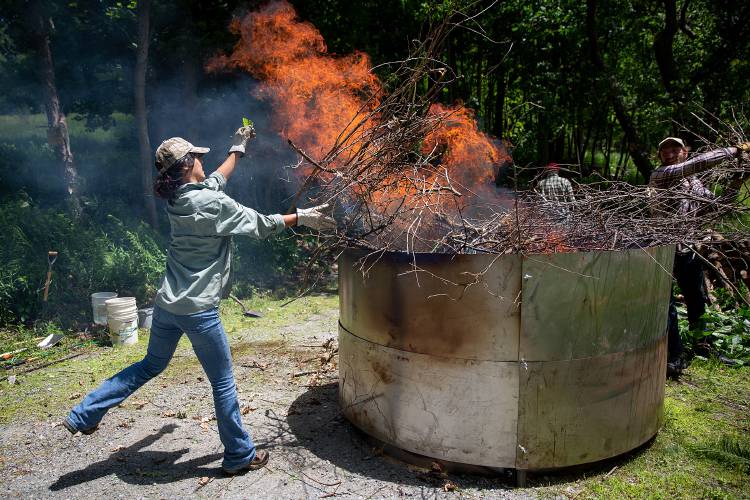Biochar Production
Biochar production is a promising solution for carbon sequestration and soil improvement. This process converts organic waste into a stable form of carbon that can be stored in soil for centuries.

Biochar helps farmers get more life out of dead plants (vnews.com)
job openings
View open jobs in this Solution
Example Companies
- Airex Energy - Airex Energy has successfully developed an exciting new technology for biomass torrefaction.
- Carbo Culture - Develops technology to convert biomass into stable biochar for carbon removal.
- The Bioeconomy Institute Carbon Removal - $1 million XPrize winning team that developed small and large-scale pyrolyzers for biochar production.
- Pacific Biochar - Produces high-quality biochar from waste biomass for agricultural and environmental applications.
- Biochar Now - Manufactures biochar for various applications including soil amendment and water filtration.
- Carbon Gold - Produces biochar-based products for horticulture and agriculture.
Overview
Biochar is a carbon-rich material produced by heating organic matter in a low-oxygen environment, a process called pyrolysis. It retains most of the carbon produced by decomposing biomass, effectively sequestering it for long periods when added to soil.
Progress Made
Significant progress has been made in biochar production methods, carbon capture and storage, and emission-reducing agricultural practices:
- Development of low-emission biochar kilns using renewable energy sources.
- Techniques for rapid production and utilization of agricultural waste as feedstock.
- Large-scale, environmentally friendly biochar production methods.
Learn More
Podcast Episodes
- Startup Series: Carbo Culture — MCJ Collective
- From biowaste to "biogold"
Solutions by Sector
Agriculture
- Soil Amendment: Using biochar to improve soil fertility and crop yields.
- Livestock Feed Additive: Incorporating biochar in animal feed to reduce methane emissions.
- Composting Aid: Adding biochar to compost to reduce greenhouse gas emissions and improve compost quality.
Case Studies:
- Ithaka Institute: Developed the "Kon-Tiki" kiln for on-farm biochar production, improving soil health and crop yields (Ithaka Institute).
- Cool Planet: Created biochar-based soil amendments that increase crop yields and reduce water usage (Cool Planet).
- Carbon Cycle Institute: Implemented biochar projects on California farms, demonstrating improved soil health and carbon sequestration (Carbon Cycle Institute).
Environmental Remediation
- Water Filtration: Using biochar to remove pollutants from water.
- Air Purification: Applying biochar in air filters to capture pollutants.
- Soil Contamination Treatment: Utilizing biochar to immobilize heavy metals and organic pollutants in soil.
Case Studies:
- Biochar Solutions: Developed biochar-based water filtration systems for removing contaminants from stormwater and wastewater (Biochar Solutions).
- Carbonscape: Created activated biochar for air and water purification applications (Carbonscape).
- Biochar Supreme: Implemented biochar-based soil remediation projects to treat contaminated sites (Biochar Supreme).
Energy Production
- Bioenergy: Using biochar as a byproduct of bioenergy production.
- Carbon-Negative Energy: Developing systems that produce energy while sequestering carbon through biochar production.
- Waste-to-Energy: Converting waste biomass into biochar and energy.
Case Studies:
- Pyreg: Developed modular pyrolysis systems that produce biochar and renewable energy (Pyreg).
- All Power Labs: Created small-scale biomass gasifiers that produce biochar and electricity (All Power Labs).
- Biochar Energy Systems: Implemented large-scale biochar and bioenergy production facilities (Biochar Energy Systems).
Lessons Learned
- Biochar production requires renewable energy sources and accounting for greenhouse gas emissions.
- Matching biochar type with soil and crop needs is essential for improving fertility and yields.
- Ensuring uncontaminated biochar is crucial when using it for air and water pollutant adsorption.
- Standardization and quality control are important for consistent biochar performance.
Challenges Ahead
- Lack of standardized biochar definition hampers comparison and reliable impact assessment.
- Limited data on long-term soil and plant effects, as well as potential environmental contamination.
- Insufficient infrastructure and technical expertise hinder scalability and dissemination.
- High production costs and lack of established markets for biochar products.
Best Path Forward
- Continued investment in research and development to enhance technology affordability.
- Raising awareness among the public and policymakers about biochar benefits.
- Encouraging government and business investment in biochar projects.
- Establishing standards, certification programs, and incentives for adoption.
- Developing integrated systems that combine biochar production with renewable energy generation and waste management.
Image credit: vnews.com